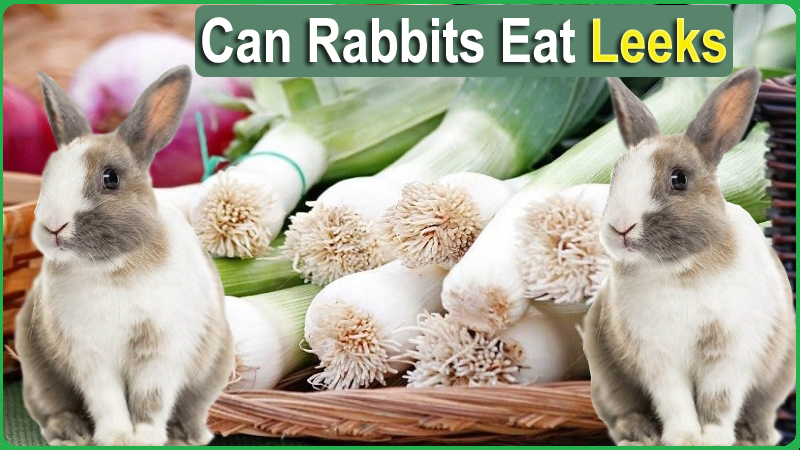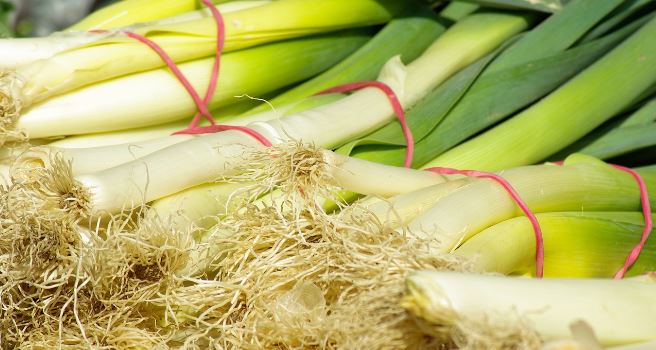Can rabbits eat Leeks? It may be confusion for you. As being pet parents, leeks can be considered toxic food but them for your beloved rabbits. Leek is such food that can arise many health problems like Hemolytic anemia. But, leeks are safe vegetable for human beings and for some animals but not for your bunnies.
As a vet researched report, don’t try to force to intake this vegetable to your pet rabbits. Leeks have also super rich in calcium and phosphorous compounds, which pose many stomach problems in bunnies. Therefore, should be avoiding them to our rabbits, as possible.
As being a bunny lover, we do accept that you have more curiosity get to know about why rabbits can’t intake Leeks. Don’t try to get headache. Through this article, we will explore all possible things that Is leek safe or not? If safe, then how much quantity you can serve?
Do Rabbits Like to Eat Leeks?
The answer is NO! Rabbits don’t prefer to have leeks, and other versions of the genus Allium like as onions, garlic, green onions, because they pose a super high aroma. Therefore, they don’t like to eat them.

Although, at some times, you’re pet rabbits may have more crazy to nibble this leek. That is why; this vegetable should be keeping away to your bunny’s reach.
Other than, if this leek is growing in your garden, so you have to consider fencing around the garden.
Nutritional Benefits of Leeks for Your Bunnies
As per the pet parents, these leeks have also something beneficial for your bunnies. So, they are not 100% useless for them, at the least. Leeks are in some helpful vitamins, minerals, and antioxidants
Also Read: Can Rabbits Eat Figs? Benefits & Risks Explained
As a researched that leeks are excellent source of antioxidant compounds. So, higher installed antioxidant foods are essential for processing dietary supplements for your beloved rabbits. These compound helping out decrease the level of developing heart problems and other variants of cancers on bunnies.
As bunny experts, leeks have also some important vitamins A, C, and K that support their overall well-health and immune function.
Being low in calories, leeks are a healthy addition to a rabbit’s diet without risk of over-weight.
Potassium and magnesium minerals are also present on this vegetable that is crucial for well- cardiovascular health.
In suddenly, if bunnies intake leek too much, then may arise stomach problems. Don’t worry! Now, you can try to offer them fresh hay and water.
If, you seem that not eating well by your rabbits, may be their digestive system do disturb. As well as, if bunnies didn’t poop for the last 12 hours, now you have to talk your veterinarian immediately.
Potential Downsides to Feeding Leeks
If you do anything on your life, risks are always present on them. So, you should be knowing about these risks, you may take decision whether to do it or not. As a owners of rabbit, you should be knowing bad impact of leeks, if fed them in too much.
Also Read: Can Rabbits Eat Cabbage? Feeding Guide
Leeks come in the member of the allium family (like onions and garlic). They can be hard to digest for your bunnies, so gastrointestinal distress or upset stomach problems can persist on them.
As a research reported, don’t offer this vegetable in rich amount to bunnies, because having sulphur compounds. Otherwise, they may develop many bad symptoms like as lethargy, weakness, or anemia.
Keep remembering, rabbit’s digestive systems are more sensitive to change. Therefore, they do more hard work to digest leek’s parts, can cause get gas and bloating in them.
Every breeds of rabbits have liking and disliking are differently. If, some rabbits do deny of eating to leeks, then mostly food can be wasted. That is why, should be careful to feed leeks.
While you buying leeks from super market, then some pesticides are presence on them. To be pay attention, before giving leeks to them that they should be thoroughly washed under warm water to remove any present pesticide. Otherwise, you can opt organically grown leek vegetables.
Signs of Leek Toxicity in Rabbits
If your rabbits consume leeks in small quantities as gradually, so they have less chance to get from toxicity. Usually, the poisoning occurs when they intake continuous in large amount in every day. Cause of this, some possible symptoms can develope.
A sudden decrease or increase in appetite can indicate a health problem.
If you seem that your bunnies get less active or is hiding more than usual, then may be sign of illness.
Changes in stool consistency can blink green signal to digestive problems.
If your rabbits are suspected with respiratory problems like difficulty in breathing, then should be addressed promptly.
As told above, leeks have a hard texture. Therefore, due to this, they can suffer many dental problems like as overgrown teeth, or drooling.
How Much Leek is Safe for Rabbits to Eat?
When you are going to feed leeks, it would be wise to control portion for maintaining a balanced rabbit’s diet. Although, leeks can be made an addition’s nutritious to your bunny’s meals, but they intake them exceeds can pose digestive problems.
As a researched report, small quantities are sufficient, about one to two tablespoons per serving, 1 – 2 times in a week. This strategy lets furry friend receive nutritional benefits from leeks without getting bad impact on their digestive system.
Always keep eyes on your rabbit’s bad respond to new foods and quickly talks to your veterinarian if suspected on them.
What are Safe Alternatives for Leeks?
If you want to add variety in your bunny’s diet, then several alternatives are available in the market to leek food. These alternative foods have fewer risks associated with Allium veggies.
Also Read: Can Rabbits Eat Celery? Guide to Bunny Owners
Romaine Lettuce: This leafy green is loaded with vitamins A and K that offer many essential nutrients for rabbits.
Kale: Installed with vitamins C and K, kale comes in nutrient-dense vegetables.
Parsley: This herb has super high in vitamin C, and is a tasty treat for your bunnies.
Basil: Basil is a fragrant herb that is safe for rabbits and can be offered as an occasional treat.
Cilantro: This food contains is high in vitamins A, C, and K that help to improve overall well-health.
Carrot Tops: Carrots should be given sparingly due to their sugar content; but leafy green tops are safe and nutritious for rabbits.
Tips for Preparing leeks for Rabbits
Leeks are not recommended for rabbits due to potential toxicity. But, our rabbit experts suggest many general tips & tricks for preparing vegetables safely for rabbits:
Wash Thoroughly
Rinse under cold water to remove dirt and pesticides.
Use a soft brush for tougher skins like carrots and cucumbers.
Choose Organic When Possible
Minimize chemical exposure by selecting organic produce.
Ensure vegetables are fresh and free from wilting or decay.
Chop into Appropriate Sizes
Cut into manageable pieces to prevent choking.
Vary shapes and sizes to stimulate natural foraging behavior.
Avoid Seasoning or Cooking
Serve all vegetables raw to preserve nutrients.
Do not add salt, oil, or any seasonings.
Introduce New Foods Gradually
Start with small amounts to monitor your rabbit’s reaction.
Observe for any signs of digestive upset or allergies.
FAQs (Frequently Asked Questions)
Can Rabbits Eat Both Green and White Parts of Leeks?
Sorry, it would be wise to offer the white that is soft portion of leeks for rabbits. Green tops are hard part, so difficult to digest them.
Can Rabbits Eat Raw Leeks?
As per the feeding guide by experts, first you have to cock leeks then can serve them to your bunnies. Cooked leeks convert into tender, easier to digest, that is why, having less risk of gastrointestinal upset.
Can Rabbits Eat Leek Leaves and It Tops?
You should never give leek leaves or any part of its plant. Leeks contain the sulfates compounds that can be toxic to rabbits. Frequently consuming them can cause oxidative that damage to their red blood cells, and leading to hemolytic anemia issue.
Conclusion: Can Rabbits Eat Leeks?
Now, finally, you may look leeks as innocent, otherwise can be dangerous to your beloved rabbit’s health.
By knowing all risks that are associated with feeding leeks; you can easily choose safer other options that you will take a good decision about how to live your pet always enjoy good health.
Also Read: Can Rabbits Eat Blueberries? Nutritional Benefits & Risks
Do you have any experience, tips, tricks, or query regarding on this? You can drop a comment!
Have a Nice Day!






